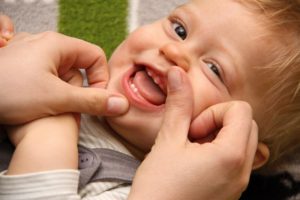Oh Baby! 5 Signs of Teething
June 17, 2022

Time is flying by. It feels like just yesterday that your baby was a newborn waking up every two or three hours, but now they sleep for longer stretches. That is, until now—they’ve started to wake up several times and are fussier than they typically are.
What could be wrong? What does this symptom mean? It could be a sign that your baby is teething. In fact, there are several ways you can tell that you’ve entered this exciting new stage of development. Keep reading to learn about the most common symptoms of teething and what you can do to help your baby.
Swollen, Tender Gums
To erupt, your baby’s teeth have to cut and push through the gums, which makes this soft tissue sore and tender. Instead of massaging your baby’s gums, a safer option is to give them a frozen baby toy or frozen damp washcloth they can chew on. The cold numbs their gum tissue, giving them temporary relief. Just make sure you buy a teething toy that is thick enough that they won’t puncture through and leak fluid.
Putting Things in the Mouth
Most babies explore the world by putting objects in their mouth, but you may find that your teething baby does it more frequently during this phase. Basically, if you notice that they spend more time keeping toys or their hands inside their mouth, they could be teething and trying to soothe their gums.
Especially while they are teething, you need to make sure that sharp, hard, or other inappropriate objects are outside their reach to prevent oral injury. Instead give them cold teething toys that can satiate their desire to mouth while alleviating their discomfort. For more advice about teething toys, you can talk to your pediatric dentist.
Fussiness
The teething process is not exactly comfortable for your baby. As a result, you may notice that they are more cranky or fussy than they usually are. Although dealing with a teething baby can be challenging, try to stay patient and understand what they are experiencing.
If your baby seems to be really uncomfortable, especially at night, you can give them some over-the-counter pain reliever specially formulated for little ones.
More Drooling Than Usual
As their mouth prepares for a tooth to come in, it salivates more. Unfortunately, excessive drool often leads to a rash on their sensitive skin, particularly on the chin and cheeks around their lips. As you might imagine, chapped skin can make an already stressful situation worse for a teething baby!
With this symptom, your baby needs to be monitored and dried on a regular basis to prevent a rash from developing. You may want to consider putting a clean, dry bib on them for easier wiping.
Changes in Sleeping or Eating
One of the hardest parts of having a teething baby is disruptions to their sleeping and eating patterns. A baby that used to sleep all night can suddenly wake up multiple times, which only increases their daytime fussiness and your fatigue. They can also struggle to eat, even if the food doesn’t require chewing.
Although teething can be a trying time, with patience and some tricks up your sleeve, you can get through it and see your little one advance to the next stage of life with a new smile!
About the Practice
Dr. Maggie Davis & Associates is proud to have three pediatric dentists on staff. In addition to Dr. Maggie, Dr. Eva Dupay and Dr. Lorielle Alter bring a unique background of expertise, but we all have a similar passion for helping children and their families achieve dental wellness at every age. If you have questions about teething or any other dental concerns, you can schedule an appointment at our Palm Harbor office by calling 727-786-7551 or online.
